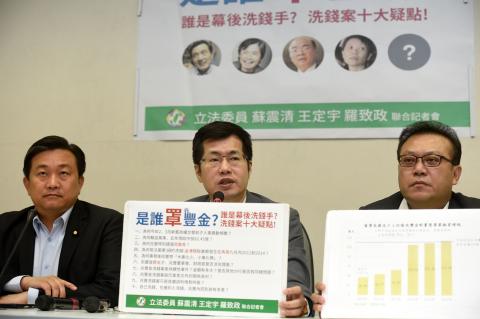US authorities had warned Mega International Commercial Bank’s New York branch that it had violated US money laundering regulations as early as 2013, after the bank dramatically increased the size of loans to businesses affiliated with the Chinese Nationalist Party (KMT), Democratic Progressive Party (DPP) legislators said yesterday.
The lawmakers said they wondered if the KMT had been involved in money laundering to hide its assets.
DPP Legislator Wang Ding-yu (王定宇) cited an anonymous source as saying that the New York State Department of Financial Services in 2013 filed a consent order to ask the branch to take corrective actions after failing to comply with US regulations against money laundering.

Photo: George Tsorng, Taipei Times
That was prior to the department’s recent report about the New York branch’s activities last year, suggesting Mega International’s management had been aware of the branch’s failure to comply for a few years, Wang said.
The department last week fined the New York bank US$180 million for not complying with money laundering regulations, and failing to heed the order and take corrective measures.
The Financial Supervisory Commission (FSC) should have been aware of the matter in 2013, because government representatives were members of the state-controlled bank’s board of directors, he said.
“The bank and the government’s unwillingness to take immediate action on the bank’s obvious violations suggests that there was a group behind the money laundering activity,” he said.
DPP Legislator Su Chen-ching (蘇震清) said the bank increased the size of its loan to Central Investment Co — a KMT holding company — and its affiliated companies from NT$3.68 billion (US$116.07 million at the current exchange rate) in 2010 to NT$11.19 billion last year.
The activities occurred when Mckinney Tsai (蔡友才) was chairman of the bank. He had been appointed by former president Ma Ying-jeou (馬英九).
“Central Investment’s paid-in capital was just NT$11 billion, so why did Mega International Commercial Bank allow the company to borrow more money than its capital,” Su said. “If this is not hollowing out, what is?”
The DPP lawmaker said the case must be handled carefully to prevent the KMT from hiding more assets through secret channels.
DPP Legislator Lo Chih-cheng (羅致政) said the money laundering and the increase to Central Investment’s loan occurred when close Ma aide King Pu-tsung (金溥聰) was serving as the nation’s representative to Washington.
He also questioned Mega bank’s appointment of Ma’s wife, Chow Mei-ching (周美青), to a high-level position at the bank’s charity foundation and payment for her bodyguards.
Lo said the timing of Tsai’s resignation in April, just months before the scandal broke, raised the question of whether Tsai was aware of and deliberately concealed the violations.
The DPP lawmakers called on Premier Lin Chuan (林全), who on Sunday ordered the FSC to form a committee to investigate the issue, to commission a third-party agency to direct the investigation and exclude the FSC, which they said might be involved in money laundering.
They also urged investigators to identify the bank’s customers and whether its other overseas branches have been engaged in illegal activities.

The manufacture of the remaining 28 M1A2T Abrams tanks Taiwan purchased from the US has recently been completed, and they are expected to be delivered within the next one to two months, a source said yesterday. The Ministry of National Defense is arranging cargo ships to transport the tanks to Taiwan as soon as possible, said the source, who is familiar with the matter. The estimated arrival time ranges from late this month to early next month, the source said. The 28 Abrams tanks make up the third and final batch of a total of 108 tanks, valued at about NT$40.5 billion

A group from the Taiwanese Designers in Australia association yesterday represented Taiwan at the Midsumma Pride March in Melbourne. The march, held in the St. Kilda suburb, is the city’s largest LGBTQIA+ parade and the flagship event of the annual Midsumma Festival. It attracted more than 45,000 spectators who supported the 400 groups and 10,000 marchers that participated this year, the association said. Taiwanese Designers said they organized a team to march for Taiwan this year, joining politicians, government agencies, professionals and community organizations in showing support for LGBTQIA+ people and diverse communities. As the first country in Asia to legalize same-sex

Travel agencies in Taiwan are working to secure alternative flights for travelers bound for New Zealand for the Lunar New Year holiday, as Air New Zealand workers are set to strike next week. The airline said that it has confirmed that the planned industrial action by its international wide-body cabin crew would go ahead on Thursday and Friday next week. While the Auckland-based carrier pledged to take reasonable measures to mitigate the impact of the workers’ strike, an Air New Zealand flight arriving at Taipei from Auckland on Thursday and another flight departing from Taipei for Auckland on Saturday would have to

MOTIVES QUESTIONED The PLA considers Xi’s policies toward Taiwan to be driven by personal considerations rather than military assessment, the Epoch Times reports Chinese President Xi Jinping’s (習近平) latest purge of the Chinese People’s Liberation Army (PLA) leadership might have been prompted by the military’s opposition to plans of invading Taiwan, the Epoch Times said. The Chinese military opposes waging war against Taiwan by a large consensus, putting it at odds with Xi’s vision, the Falun Gong-affiliated daily said in a report on Thursday, citing anonymous sources with insight into the PLA’s inner workings. The opposition is not the opinion of a few generals, but a widely shared view among the PLA cadre, the Epoch Times cited them as saying. “Chinese forces know full well that